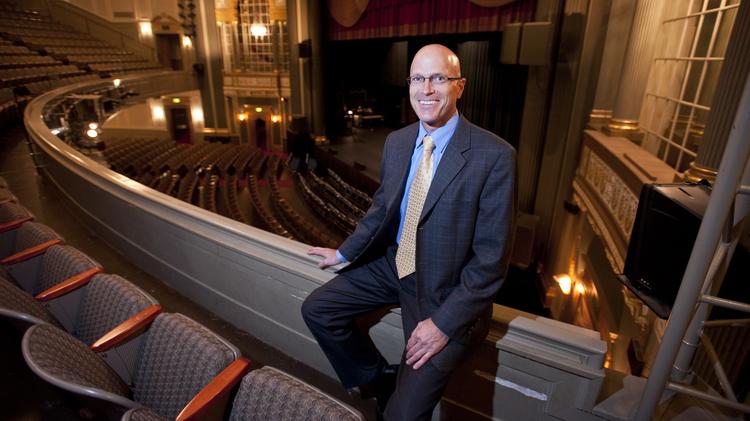 |
| Metro Council President Jim King watches as Kim Tichenor signs the April 25 agreement with Louisville Orchestra Board President Chuck Maisch. |
By Keith Waits
Entire contents are copyright © 2012 Keith Waits. All rights reserved.
Early in the process of renegotiations between the Louisville Orchestra management and the musicians, local businessman Jim King resigned from the Orchestra board. It may have seemed a curious decision to remove oneself at such a difficult time in the venerable organization’s history. But as president of the Louisville Metro Council, Mr. King suspected that somewhere down the line he might able to provide a greater service than being one vote on the board. As the months passed and the gulf between labor and management appeared to grow wider and deeper, with an entire season of performances lost, there seemed very little hope that an agreement was possible. Management seemed intent on hiring replacement musicians and the Musicians Union seemed committed to a prolonged stay at the picket lines.
Then, to the surprise of many, on April 25 of this year, in a ceremony hastily organized on the stage of the Whitney Auditorium, a one-year agreement was signed by Kim Tichenor – Chairperson of the Musicians Negotiating Committee, and Chuck Maisch – Louisville Orchestra Board President. It was presided over by Louisville Mayor Greg Fisher and Mr. King, who had been instrumental in brokering talks that were kept tightly under wraps. A recent conversation with Mr. King clarified his role, which, despite his matter-of-fact description of events, seemed crucial to achieving this breakthrough.
Initially invited by the Musicians Negotiating Committee, the Council President’s entry into the scenario was met with enthusiasm by both sides. With more than 30 years’ experience in labor negotiations, and with his background as a former Louisville Orchestra board member, King was ideally suited to the task. He initiated the first of series of proposals that were eventually revised to include feedback from both sides, back and forth, almost twenty times over the course of a three-week period.
After such a prolonged period of contentious and highly public disputes, “It was important not to let the emotions guide decisions,” stated King. “I was keenly aware of the hot button issues for both sides, but a level of professionalism was maintained throughout.”
Discretion was also an essential element to, as King puts it, “earning and keeping the trust,” and his effectiveness depended on “not breaching the confidence,” which still holds true now that the agreement is signed. “The terms are confidential, and the focus now is on negotiating for the consultant that will help draft the collective bargaining agreement one year from now.”
The agreement with the Louisville Federation of Musicians Local 11-637, which took effect June 1, reportedly allows for 57 musicians working for 30 weeks at the same base salary ($925 weekly) that was paid under the previous contract. The abbreviated season is expected to save $1.6 million from the previous budget.
The fact that King stepped in when he did after so many other efforts had failed to resolve the dispute illustrates what King called “a bully pulpit,” which he feels is appropriate to use “anytime the Council President can facilitate a dispute between a set of thirrd parties and it is in the city’s interests.”
.




